Essay: Young Adulthood Development and Social Work Role
VerifiedAdded on 2022/09/01
|8
|2307
|29
Essay
AI Summary
This essay explores the developmental stage of young adulthood, characterized by significant physical, psychological, and emotional changes. It examines the pursuit of autonomy, identity formation, and cognitive development, including postformal operational thinking. The essay highlights social and emotional development, including identity, moral, and career development. A major focus is on the social issue of drug addiction among young adults, discussing its causes and consequences, including its impact on brain function, mental health, and societal issues like crime. The essay concludes by examining the crucial role of social workers in addressing these challenges, including assessment, counseling, and intervention strategies such as motivational interviewing and program development, to support young adults facing these complex issues. The essay references several research studies that support the arguments made in the paper.
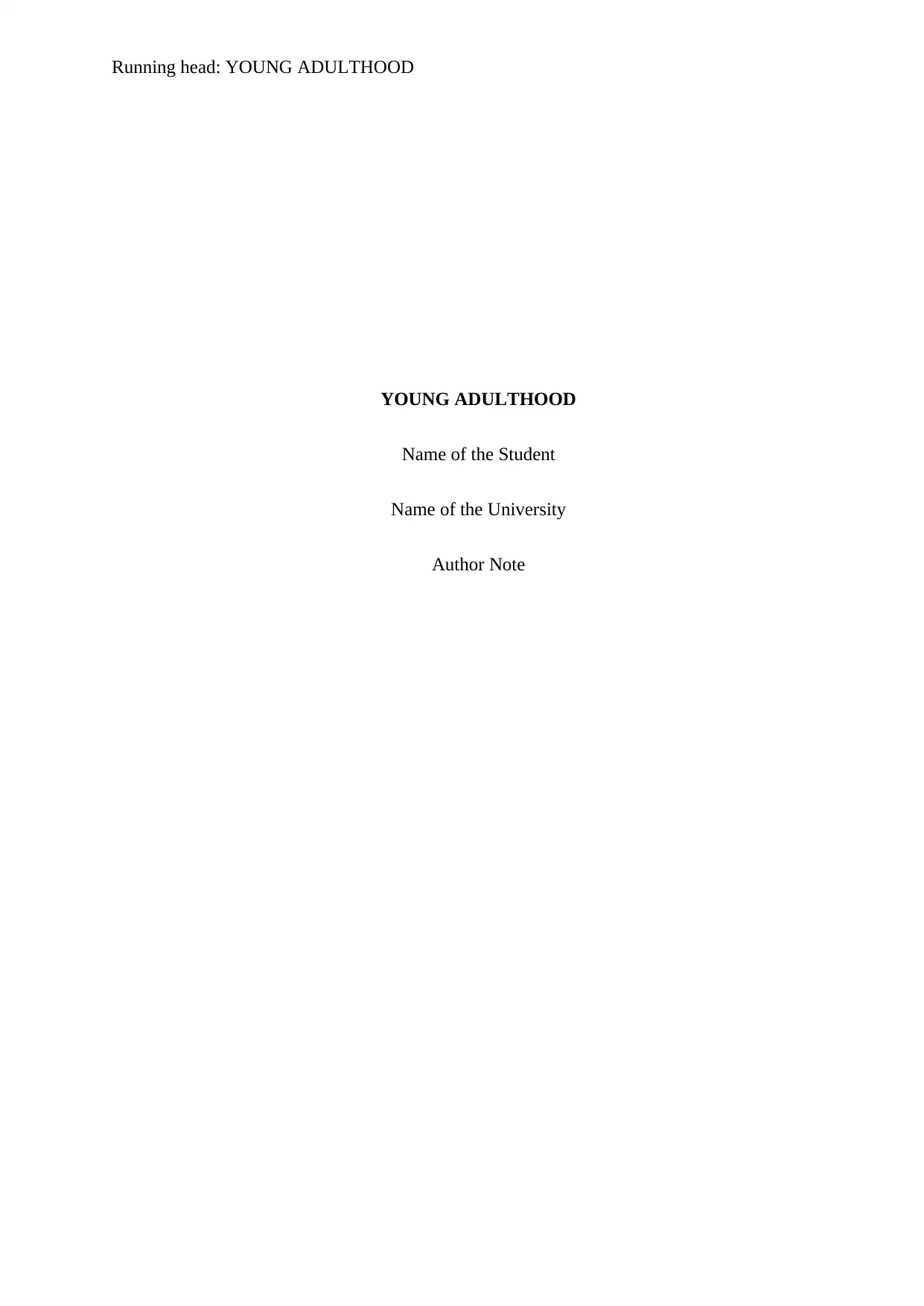
Running head: YOUNG ADULTHOOD
YOUNG ADULTHOOD
Name of the Student
Name of the University
Author Note
YOUNG ADULTHOOD
Name of the Student
Name of the University
Author Note
Paraphrase This Document
Need a fresh take? Get an instant paraphrase of this document with our AI Paraphraser
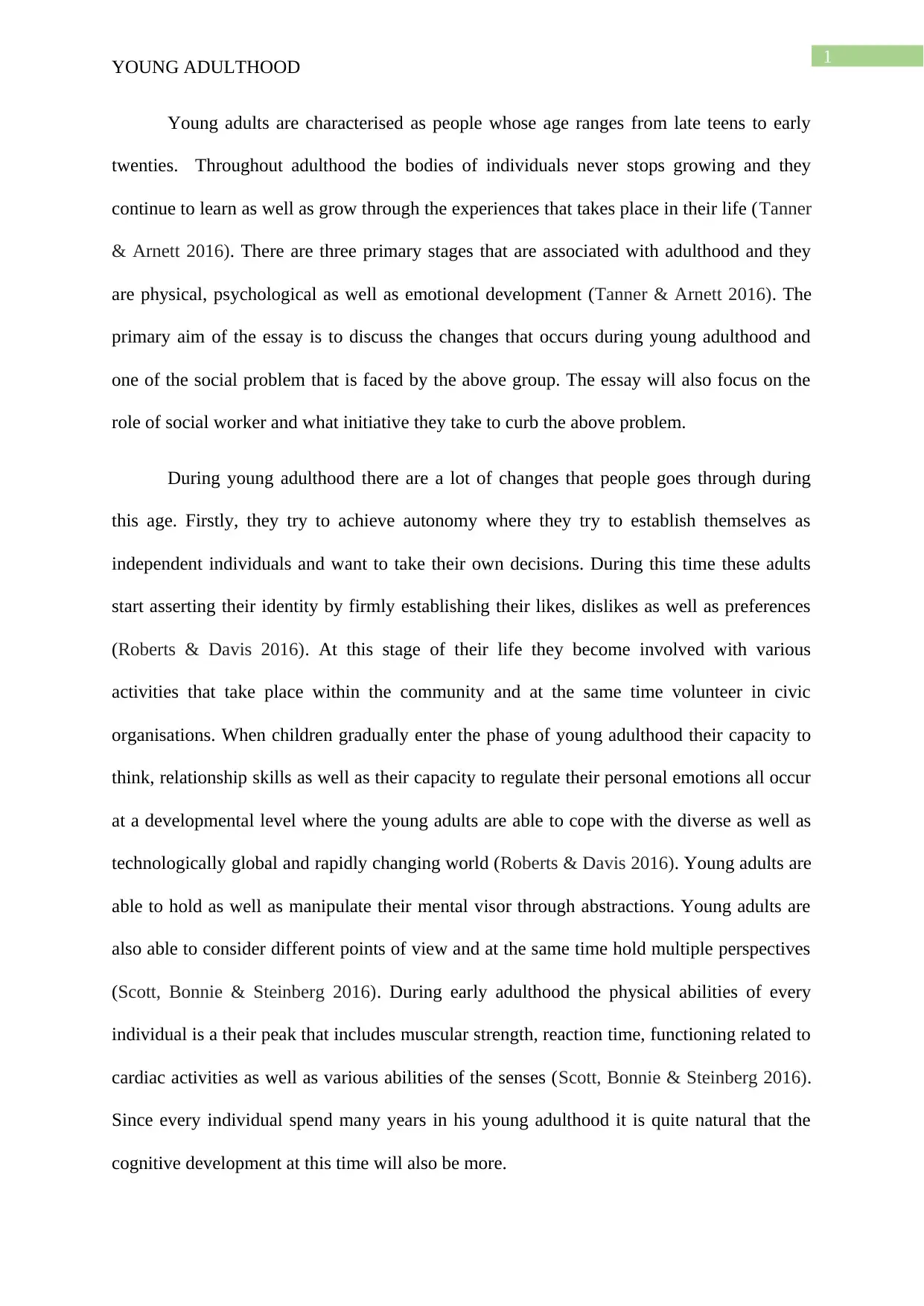
1
YOUNG ADULTHOOD
Young adults are characterised as people whose age ranges from late teens to early
twenties. Throughout adulthood the bodies of individuals never stops growing and they
continue to learn as well as grow through the experiences that takes place in their life (Tanner
& Arnett 2016). There are three primary stages that are associated with adulthood and they
are physical, psychological as well as emotional development (Tanner & Arnett 2016). The
primary aim of the essay is to discuss the changes that occurs during young adulthood and
one of the social problem that is faced by the above group. The essay will also focus on the
role of social worker and what initiative they take to curb the above problem.
During young adulthood there are a lot of changes that people goes through during
this age. Firstly, they try to achieve autonomy where they try to establish themselves as
independent individuals and want to take their own decisions. During this time these adults
start asserting their identity by firmly establishing their likes, dislikes as well as preferences
(Roberts & Davis 2016). At this stage of their life they become involved with various
activities that take place within the community and at the same time volunteer in civic
organisations. When children gradually enter the phase of young adulthood their capacity to
think, relationship skills as well as their capacity to regulate their personal emotions all occur
at a developmental level where the young adults are able to cope with the diverse as well as
technologically global and rapidly changing world (Roberts & Davis 2016). Young adults are
able to hold as well as manipulate their mental visor through abstractions. Young adults are
also able to consider different points of view and at the same time hold multiple perspectives
(Scott, Bonnie & Steinberg 2016). During early adulthood the physical abilities of every
individual is a their peak that includes muscular strength, reaction time, functioning related to
cardiac activities as well as various abilities of the senses (Scott, Bonnie & Steinberg 2016).
Since every individual spend many years in his young adulthood it is quite natural that the
cognitive development at this time will also be more.
YOUNG ADULTHOOD
Young adults are characterised as people whose age ranges from late teens to early
twenties. Throughout adulthood the bodies of individuals never stops growing and they
continue to learn as well as grow through the experiences that takes place in their life (Tanner
& Arnett 2016). There are three primary stages that are associated with adulthood and they
are physical, psychological as well as emotional development (Tanner & Arnett 2016). The
primary aim of the essay is to discuss the changes that occurs during young adulthood and
one of the social problem that is faced by the above group. The essay will also focus on the
role of social worker and what initiative they take to curb the above problem.
During young adulthood there are a lot of changes that people goes through during
this age. Firstly, they try to achieve autonomy where they try to establish themselves as
independent individuals and want to take their own decisions. During this time these adults
start asserting their identity by firmly establishing their likes, dislikes as well as preferences
(Roberts & Davis 2016). At this stage of their life they become involved with various
activities that take place within the community and at the same time volunteer in civic
organisations. When children gradually enter the phase of young adulthood their capacity to
think, relationship skills as well as their capacity to regulate their personal emotions all occur
at a developmental level where the young adults are able to cope with the diverse as well as
technologically global and rapidly changing world (Roberts & Davis 2016). Young adults are
able to hold as well as manipulate their mental visor through abstractions. Young adults are
also able to consider different points of view and at the same time hold multiple perspectives
(Scott, Bonnie & Steinberg 2016). During early adulthood the physical abilities of every
individual is a their peak that includes muscular strength, reaction time, functioning related to
cardiac activities as well as various abilities of the senses (Scott, Bonnie & Steinberg 2016).
Since every individual spend many years in his young adulthood it is quite natural that the
cognitive development at this time will also be more.
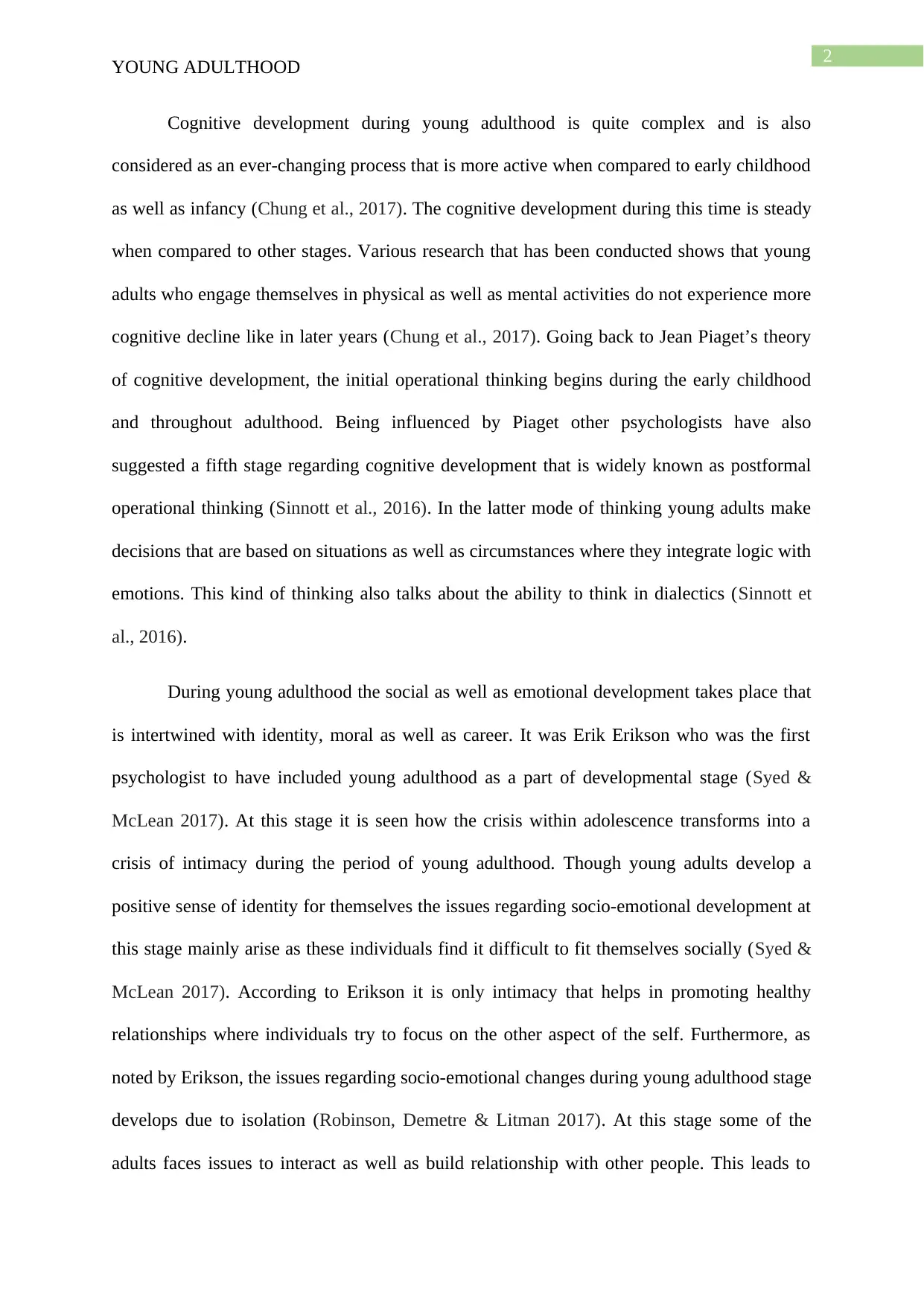
2
YOUNG ADULTHOOD
Cognitive development during young adulthood is quite complex and is also
considered as an ever-changing process that is more active when compared to early childhood
as well as infancy (Chung et al., 2017). The cognitive development during this time is steady
when compared to other stages. Various research that has been conducted shows that young
adults who engage themselves in physical as well as mental activities do not experience more
cognitive decline like in later years (Chung et al., 2017). Going back to Jean Piaget’s theory
of cognitive development, the initial operational thinking begins during the early childhood
and throughout adulthood. Being influenced by Piaget other psychologists have also
suggested a fifth stage regarding cognitive development that is widely known as postformal
operational thinking (Sinnott et al., 2016). In the latter mode of thinking young adults make
decisions that are based on situations as well as circumstances where they integrate logic with
emotions. This kind of thinking also talks about the ability to think in dialectics (Sinnott et
al., 2016).
During young adulthood the social as well as emotional development takes place that
is intertwined with identity, moral as well as career. It was Erik Erikson who was the first
psychologist to have included young adulthood as a part of developmental stage (Syed &
McLean 2017). At this stage it is seen how the crisis within adolescence transforms into a
crisis of intimacy during the period of young adulthood. Though young adults develop a
positive sense of identity for themselves the issues regarding socio-emotional development at
this stage mainly arise as these individuals find it difficult to fit themselves socially (Syed &
McLean 2017). According to Erikson it is only intimacy that helps in promoting healthy
relationships where individuals try to focus on the other aspect of the self. Furthermore, as
noted by Erikson, the issues regarding socio-emotional changes during young adulthood stage
develops due to isolation (Robinson, Demetre & Litman 2017). At this stage some of the
adults faces issues to interact as well as build relationship with other people. This leads to
YOUNG ADULTHOOD
Cognitive development during young adulthood is quite complex and is also
considered as an ever-changing process that is more active when compared to early childhood
as well as infancy (Chung et al., 2017). The cognitive development during this time is steady
when compared to other stages. Various research that has been conducted shows that young
adults who engage themselves in physical as well as mental activities do not experience more
cognitive decline like in later years (Chung et al., 2017). Going back to Jean Piaget’s theory
of cognitive development, the initial operational thinking begins during the early childhood
and throughout adulthood. Being influenced by Piaget other psychologists have also
suggested a fifth stage regarding cognitive development that is widely known as postformal
operational thinking (Sinnott et al., 2016). In the latter mode of thinking young adults make
decisions that are based on situations as well as circumstances where they integrate logic with
emotions. This kind of thinking also talks about the ability to think in dialectics (Sinnott et
al., 2016).
During young adulthood the social as well as emotional development takes place that
is intertwined with identity, moral as well as career. It was Erik Erikson who was the first
psychologist to have included young adulthood as a part of developmental stage (Syed &
McLean 2017). At this stage it is seen how the crisis within adolescence transforms into a
crisis of intimacy during the period of young adulthood. Though young adults develop a
positive sense of identity for themselves the issues regarding socio-emotional development at
this stage mainly arise as these individuals find it difficult to fit themselves socially (Syed &
McLean 2017). According to Erikson it is only intimacy that helps in promoting healthy
relationships where individuals try to focus on the other aspect of the self. Furthermore, as
noted by Erikson, the issues regarding socio-emotional changes during young adulthood stage
develops due to isolation (Robinson, Demetre & Litman 2017). At this stage some of the
adults faces issues to interact as well as build relationship with other people. This leads to
⊘ This is a preview!⊘
Do you want full access?
Subscribe today to unlock all pages.

Trusted by 1+ million students worldwide
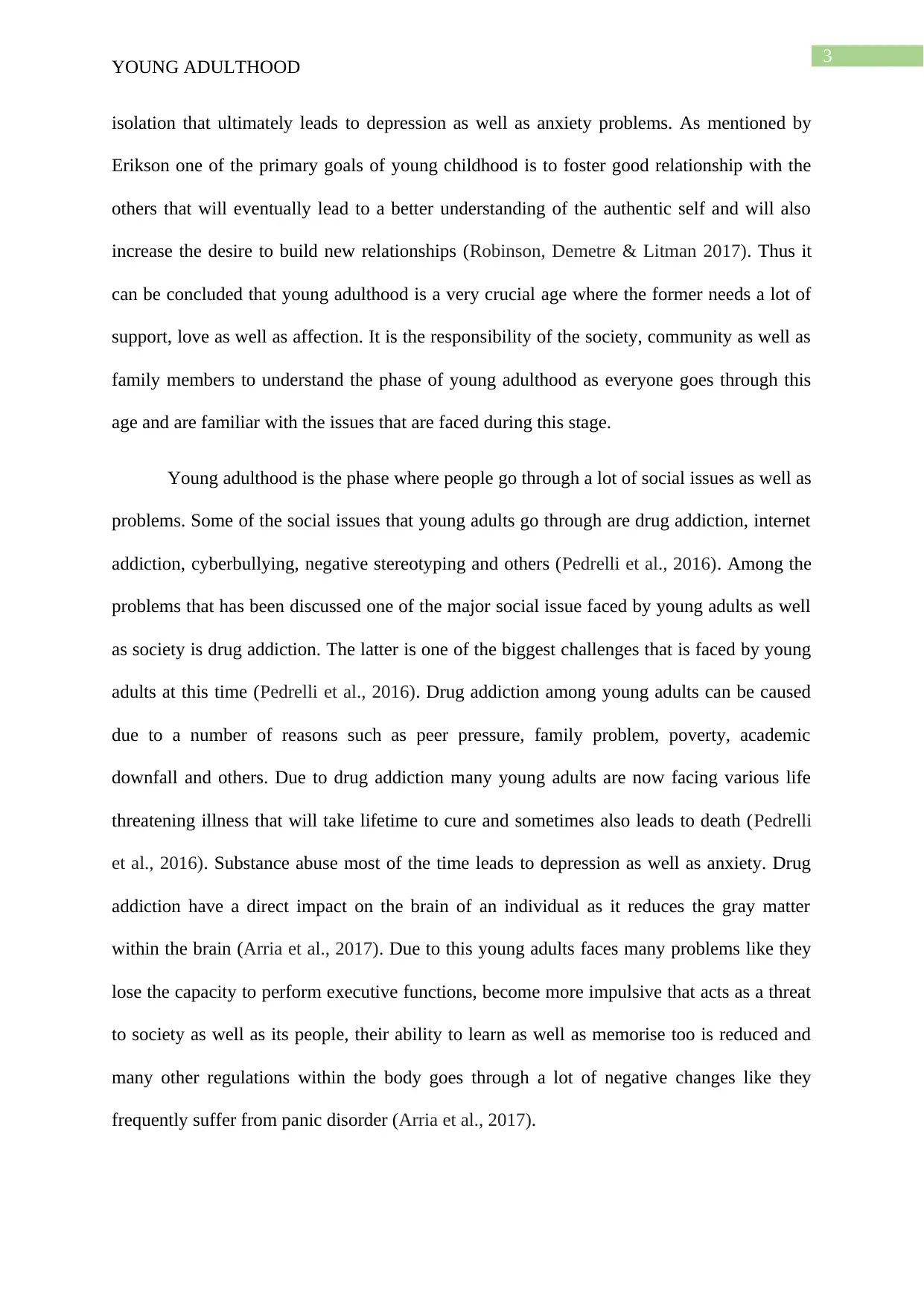
3
YOUNG ADULTHOOD
isolation that ultimately leads to depression as well as anxiety problems. As mentioned by
Erikson one of the primary goals of young childhood is to foster good relationship with the
others that will eventually lead to a better understanding of the authentic self and will also
increase the desire to build new relationships (Robinson, Demetre & Litman 2017). Thus it
can be concluded that young adulthood is a very crucial age where the former needs a lot of
support, love as well as affection. It is the responsibility of the society, community as well as
family members to understand the phase of young adulthood as everyone goes through this
age and are familiar with the issues that are faced during this stage.
Young adulthood is the phase where people go through a lot of social issues as well as
problems. Some of the social issues that young adults go through are drug addiction, internet
addiction, cyberbullying, negative stereotyping and others (Pedrelli et al., 2016). Among the
problems that has been discussed one of the major social issue faced by young adults as well
as society is drug addiction. The latter is one of the biggest challenges that is faced by young
adults at this time (Pedrelli et al., 2016). Drug addiction among young adults can be caused
due to a number of reasons such as peer pressure, family problem, poverty, academic
downfall and others. Due to drug addiction many young adults are now facing various life
threatening illness that will take lifetime to cure and sometimes also leads to death (Pedrelli
et al., 2016). Substance abuse most of the time leads to depression as well as anxiety. Drug
addiction have a direct impact on the brain of an individual as it reduces the gray matter
within the brain (Arria et al., 2017). Due to this young adults faces many problems like they
lose the capacity to perform executive functions, become more impulsive that acts as a threat
to society as well as its people, their ability to learn as well as memorise too is reduced and
many other regulations within the body goes through a lot of negative changes like they
frequently suffer from panic disorder (Arria et al., 2017).
YOUNG ADULTHOOD
isolation that ultimately leads to depression as well as anxiety problems. As mentioned by
Erikson one of the primary goals of young childhood is to foster good relationship with the
others that will eventually lead to a better understanding of the authentic self and will also
increase the desire to build new relationships (Robinson, Demetre & Litman 2017). Thus it
can be concluded that young adulthood is a very crucial age where the former needs a lot of
support, love as well as affection. It is the responsibility of the society, community as well as
family members to understand the phase of young adulthood as everyone goes through this
age and are familiar with the issues that are faced during this stage.
Young adulthood is the phase where people go through a lot of social issues as well as
problems. Some of the social issues that young adults go through are drug addiction, internet
addiction, cyberbullying, negative stereotyping and others (Pedrelli et al., 2016). Among the
problems that has been discussed one of the major social issue faced by young adults as well
as society is drug addiction. The latter is one of the biggest challenges that is faced by young
adults at this time (Pedrelli et al., 2016). Drug addiction among young adults can be caused
due to a number of reasons such as peer pressure, family problem, poverty, academic
downfall and others. Due to drug addiction many young adults are now facing various life
threatening illness that will take lifetime to cure and sometimes also leads to death (Pedrelli
et al., 2016). Substance abuse most of the time leads to depression as well as anxiety. Drug
addiction have a direct impact on the brain of an individual as it reduces the gray matter
within the brain (Arria et al., 2017). Due to this young adults faces many problems like they
lose the capacity to perform executive functions, become more impulsive that acts as a threat
to society as well as its people, their ability to learn as well as memorise too is reduced and
many other regulations within the body goes through a lot of negative changes like they
frequently suffer from panic disorder (Arria et al., 2017).
Paraphrase This Document
Need a fresh take? Get an instant paraphrase of this document with our AI Paraphraser
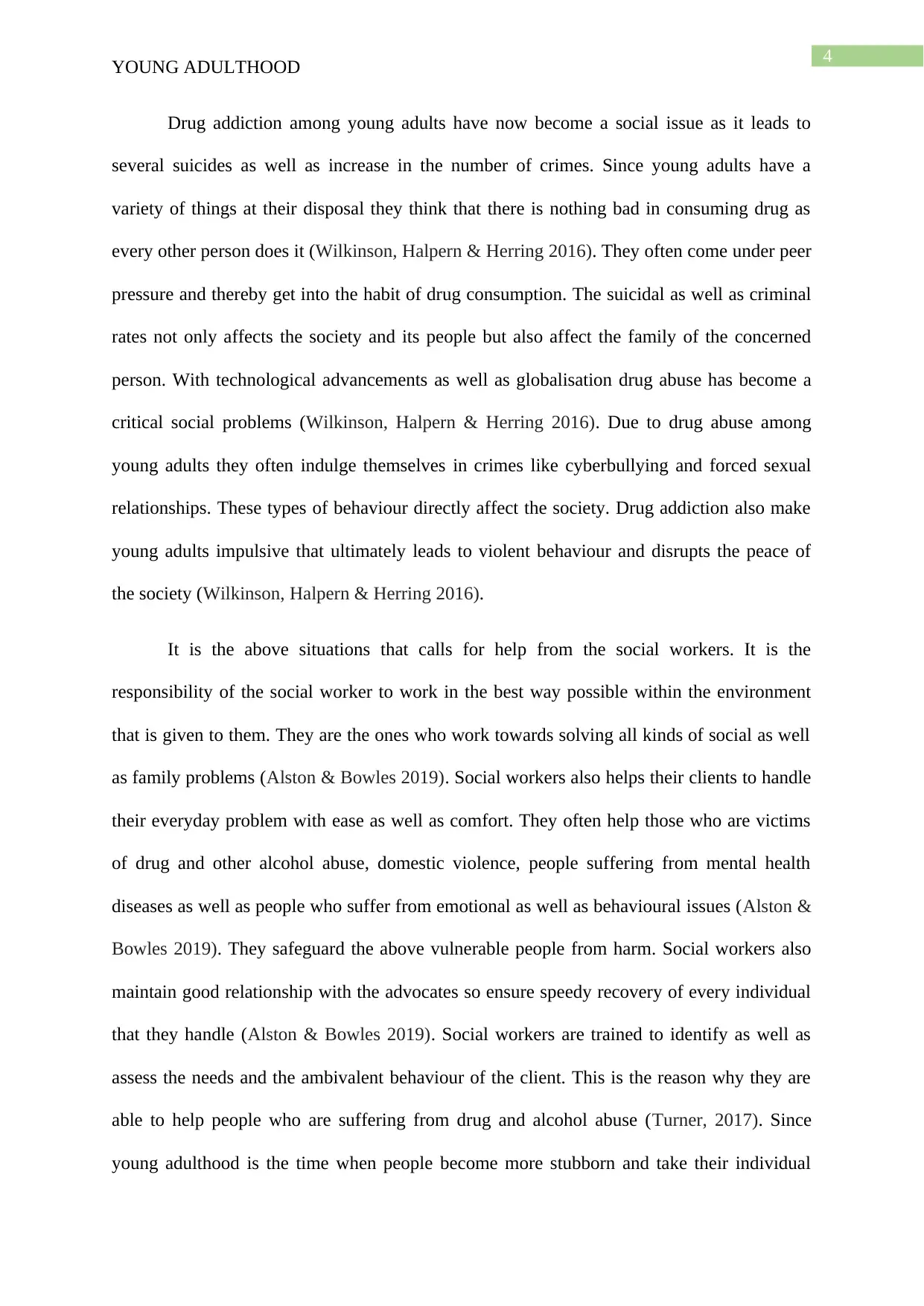
4
YOUNG ADULTHOOD
Drug addiction among young adults have now become a social issue as it leads to
several suicides as well as increase in the number of crimes. Since young adults have a
variety of things at their disposal they think that there is nothing bad in consuming drug as
every other person does it (Wilkinson, Halpern & Herring 2016). They often come under peer
pressure and thereby get into the habit of drug consumption. The suicidal as well as criminal
rates not only affects the society and its people but also affect the family of the concerned
person. With technological advancements as well as globalisation drug abuse has become a
critical social problems (Wilkinson, Halpern & Herring 2016). Due to drug abuse among
young adults they often indulge themselves in crimes like cyberbullying and forced sexual
relationships. These types of behaviour directly affect the society. Drug addiction also make
young adults impulsive that ultimately leads to violent behaviour and disrupts the peace of
the society (Wilkinson, Halpern & Herring 2016).
It is the above situations that calls for help from the social workers. It is the
responsibility of the social worker to work in the best way possible within the environment
that is given to them. They are the ones who work towards solving all kinds of social as well
as family problems (Alston & Bowles 2019). Social workers also helps their clients to handle
their everyday problem with ease as well as comfort. They often help those who are victims
of drug and other alcohol abuse, domestic violence, people suffering from mental health
diseases as well as people who suffer from emotional as well as behavioural issues (Alston &
Bowles 2019). They safeguard the above vulnerable people from harm. Social workers also
maintain good relationship with the advocates so ensure speedy recovery of every individual
that they handle (Alston & Bowles 2019). Social workers are trained to identify as well as
assess the needs and the ambivalent behaviour of the client. This is the reason why they are
able to help people who are suffering from drug and alcohol abuse (Turner, 2017). Since
young adulthood is the time when people become more stubborn and take their individual
YOUNG ADULTHOOD
Drug addiction among young adults have now become a social issue as it leads to
several suicides as well as increase in the number of crimes. Since young adults have a
variety of things at their disposal they think that there is nothing bad in consuming drug as
every other person does it (Wilkinson, Halpern & Herring 2016). They often come under peer
pressure and thereby get into the habit of drug consumption. The suicidal as well as criminal
rates not only affects the society and its people but also affect the family of the concerned
person. With technological advancements as well as globalisation drug abuse has become a
critical social problems (Wilkinson, Halpern & Herring 2016). Due to drug abuse among
young adults they often indulge themselves in crimes like cyberbullying and forced sexual
relationships. These types of behaviour directly affect the society. Drug addiction also make
young adults impulsive that ultimately leads to violent behaviour and disrupts the peace of
the society (Wilkinson, Halpern & Herring 2016).
It is the above situations that calls for help from the social workers. It is the
responsibility of the social worker to work in the best way possible within the environment
that is given to them. They are the ones who work towards solving all kinds of social as well
as family problems (Alston & Bowles 2019). Social workers also helps their clients to handle
their everyday problem with ease as well as comfort. They often help those who are victims
of drug and other alcohol abuse, domestic violence, people suffering from mental health
diseases as well as people who suffer from emotional as well as behavioural issues (Alston &
Bowles 2019). They safeguard the above vulnerable people from harm. Social workers also
maintain good relationship with the advocates so ensure speedy recovery of every individual
that they handle (Alston & Bowles 2019). Social workers are trained to identify as well as
assess the needs and the ambivalent behaviour of the client. This is the reason why they are
able to help people who are suffering from drug and alcohol abuse (Turner, 2017). Since
young adulthood is the time when people become more stubborn and take their individual
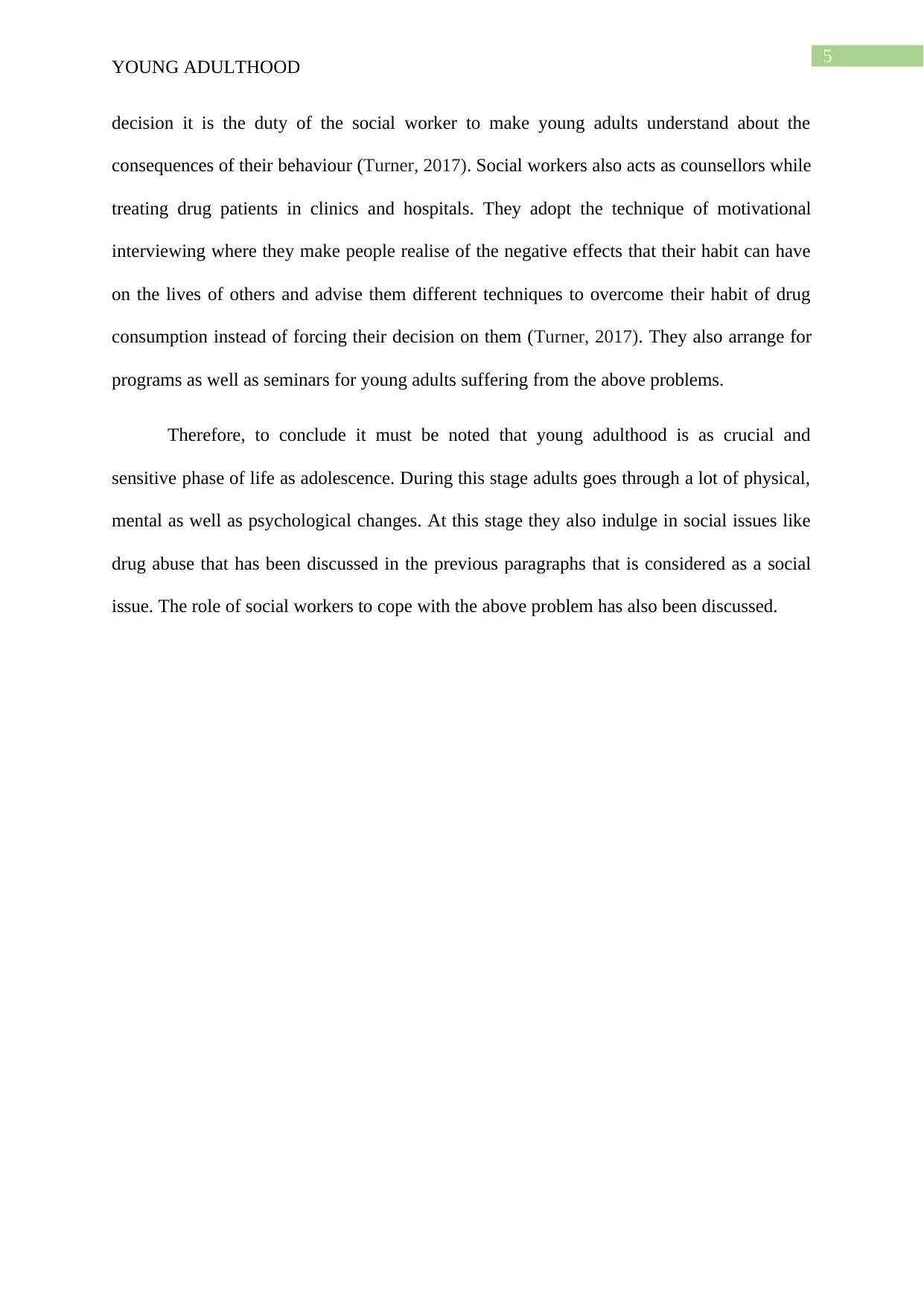
5
YOUNG ADULTHOOD
decision it is the duty of the social worker to make young adults understand about the
consequences of their behaviour (Turner, 2017). Social workers also acts as counsellors while
treating drug patients in clinics and hospitals. They adopt the technique of motivational
interviewing where they make people realise of the negative effects that their habit can have
on the lives of others and advise them different techniques to overcome their habit of drug
consumption instead of forcing their decision on them (Turner, 2017). They also arrange for
programs as well as seminars for young adults suffering from the above problems.
Therefore, to conclude it must be noted that young adulthood is as crucial and
sensitive phase of life as adolescence. During this stage adults goes through a lot of physical,
mental as well as psychological changes. At this stage they also indulge in social issues like
drug abuse that has been discussed in the previous paragraphs that is considered as a social
issue. The role of social workers to cope with the above problem has also been discussed.
YOUNG ADULTHOOD
decision it is the duty of the social worker to make young adults understand about the
consequences of their behaviour (Turner, 2017). Social workers also acts as counsellors while
treating drug patients in clinics and hospitals. They adopt the technique of motivational
interviewing where they make people realise of the negative effects that their habit can have
on the lives of others and advise them different techniques to overcome their habit of drug
consumption instead of forcing their decision on them (Turner, 2017). They also arrange for
programs as well as seminars for young adults suffering from the above problems.
Therefore, to conclude it must be noted that young adulthood is as crucial and
sensitive phase of life as adolescence. During this stage adults goes through a lot of physical,
mental as well as psychological changes. At this stage they also indulge in social issues like
drug abuse that has been discussed in the previous paragraphs that is considered as a social
issue. The role of social workers to cope with the above problem has also been discussed.
⊘ This is a preview!⊘
Do you want full access?
Subscribe today to unlock all pages.

Trusted by 1+ million students worldwide
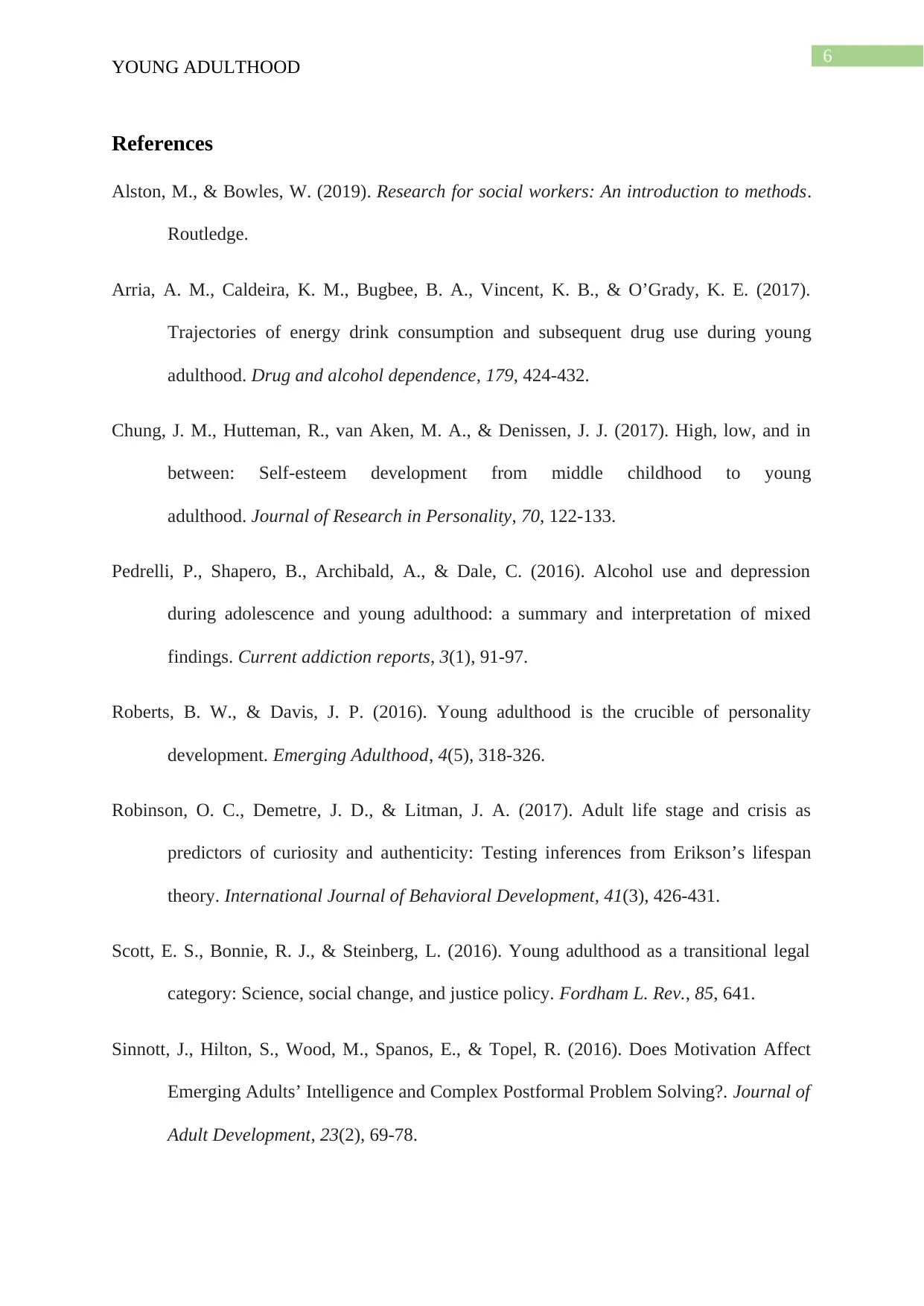
6
YOUNG ADULTHOOD
References
Alston, M., & Bowles, W. (2019). Research for social workers: An introduction to methods.
Routledge.
Arria, A. M., Caldeira, K. M., Bugbee, B. A., Vincent, K. B., & O’Grady, K. E. (2017).
Trajectories of energy drink consumption and subsequent drug use during young
adulthood. Drug and alcohol dependence, 179, 424-432.
Chung, J. M., Hutteman, R., van Aken, M. A., & Denissen, J. J. (2017). High, low, and in
between: Self-esteem development from middle childhood to young
adulthood. Journal of Research in Personality, 70, 122-133.
Pedrelli, P., Shapero, B., Archibald, A., & Dale, C. (2016). Alcohol use and depression
during adolescence and young adulthood: a summary and interpretation of mixed
findings. Current addiction reports, 3(1), 91-97.
Roberts, B. W., & Davis, J. P. (2016). Young adulthood is the crucible of personality
development. Emerging Adulthood, 4(5), 318-326.
Robinson, O. C., Demetre, J. D., & Litman, J. A. (2017). Adult life stage and crisis as
predictors of curiosity and authenticity: Testing inferences from Erikson’s lifespan
theory. International Journal of Behavioral Development, 41(3), 426-431.
Scott, E. S., Bonnie, R. J., & Steinberg, L. (2016). Young adulthood as a transitional legal
category: Science, social change, and justice policy. Fordham L. Rev., 85, 641.
Sinnott, J., Hilton, S., Wood, M., Spanos, E., & Topel, R. (2016). Does Motivation Affect
Emerging Adults’ Intelligence and Complex Postformal Problem Solving?. Journal of
Adult Development, 23(2), 69-78.
YOUNG ADULTHOOD
References
Alston, M., & Bowles, W. (2019). Research for social workers: An introduction to methods.
Routledge.
Arria, A. M., Caldeira, K. M., Bugbee, B. A., Vincent, K. B., & O’Grady, K. E. (2017).
Trajectories of energy drink consumption and subsequent drug use during young
adulthood. Drug and alcohol dependence, 179, 424-432.
Chung, J. M., Hutteman, R., van Aken, M. A., & Denissen, J. J. (2017). High, low, and in
between: Self-esteem development from middle childhood to young
adulthood. Journal of Research in Personality, 70, 122-133.
Pedrelli, P., Shapero, B., Archibald, A., & Dale, C. (2016). Alcohol use and depression
during adolescence and young adulthood: a summary and interpretation of mixed
findings. Current addiction reports, 3(1), 91-97.
Roberts, B. W., & Davis, J. P. (2016). Young adulthood is the crucible of personality
development. Emerging Adulthood, 4(5), 318-326.
Robinson, O. C., Demetre, J. D., & Litman, J. A. (2017). Adult life stage and crisis as
predictors of curiosity and authenticity: Testing inferences from Erikson’s lifespan
theory. International Journal of Behavioral Development, 41(3), 426-431.
Scott, E. S., Bonnie, R. J., & Steinberg, L. (2016). Young adulthood as a transitional legal
category: Science, social change, and justice policy. Fordham L. Rev., 85, 641.
Sinnott, J., Hilton, S., Wood, M., Spanos, E., & Topel, R. (2016). Does Motivation Affect
Emerging Adults’ Intelligence and Complex Postformal Problem Solving?. Journal of
Adult Development, 23(2), 69-78.
Paraphrase This Document
Need a fresh take? Get an instant paraphrase of this document with our AI Paraphraser
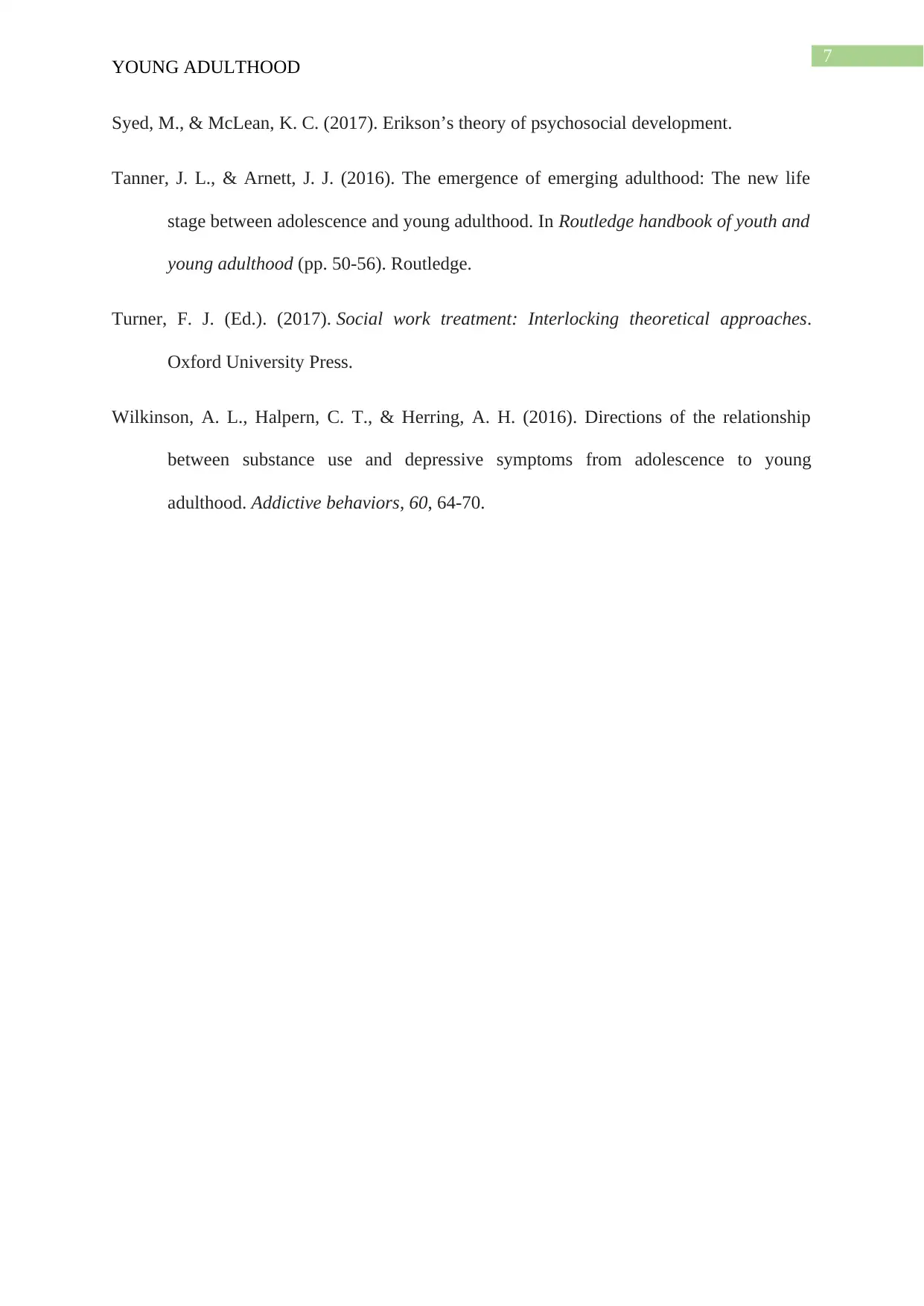
7
YOUNG ADULTHOOD
Syed, M., & McLean, K. C. (2017). Erikson’s theory of psychosocial development.
Tanner, J. L., & Arnett, J. J. (2016). The emergence of emerging adulthood: The new life
stage between adolescence and young adulthood. In Routledge handbook of youth and
young adulthood (pp. 50-56). Routledge.
Turner, F. J. (Ed.). (2017). Social work treatment: Interlocking theoretical approaches.
Oxford University Press.
Wilkinson, A. L., Halpern, C. T., & Herring, A. H. (2016). Directions of the relationship
between substance use and depressive symptoms from adolescence to young
adulthood. Addictive behaviors, 60, 64-70.
YOUNG ADULTHOOD
Syed, M., & McLean, K. C. (2017). Erikson’s theory of psychosocial development.
Tanner, J. L., & Arnett, J. J. (2016). The emergence of emerging adulthood: The new life
stage between adolescence and young adulthood. In Routledge handbook of youth and
young adulthood (pp. 50-56). Routledge.
Turner, F. J. (Ed.). (2017). Social work treatment: Interlocking theoretical approaches.
Oxford University Press.
Wilkinson, A. L., Halpern, C. T., & Herring, A. H. (2016). Directions of the relationship
between substance use and depressive symptoms from adolescence to young
adulthood. Addictive behaviors, 60, 64-70.
1 out of 8
Related Documents
Your All-in-One AI-Powered Toolkit for Academic Success.
+13062052269
info@desklib.com
Available 24*7 on WhatsApp / Email
![[object Object]](/_next/static/media/star-bottom.7253800d.svg)
Unlock your academic potential
Copyright © 2020–2026 A2Z Services. All Rights Reserved. Developed and managed by ZUCOL.





